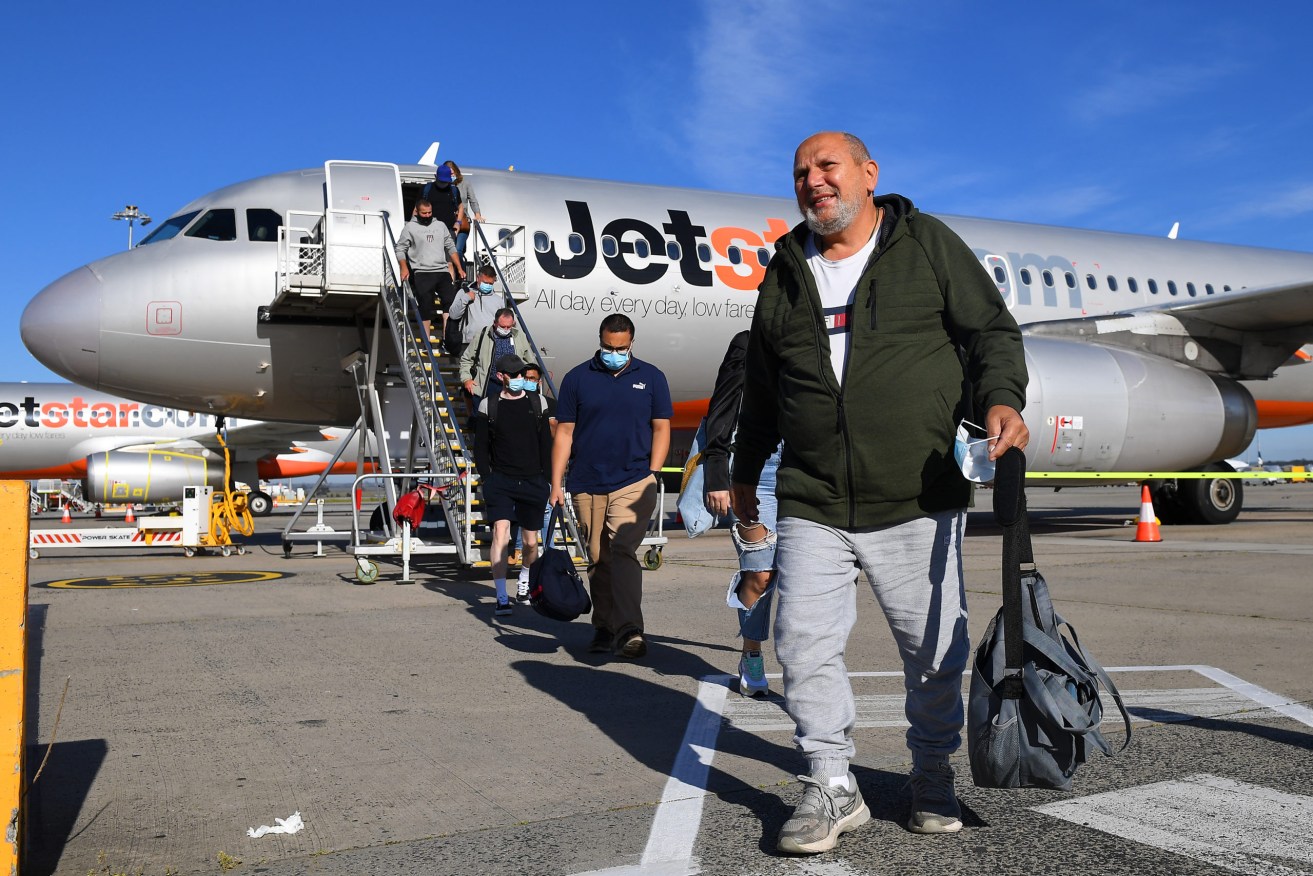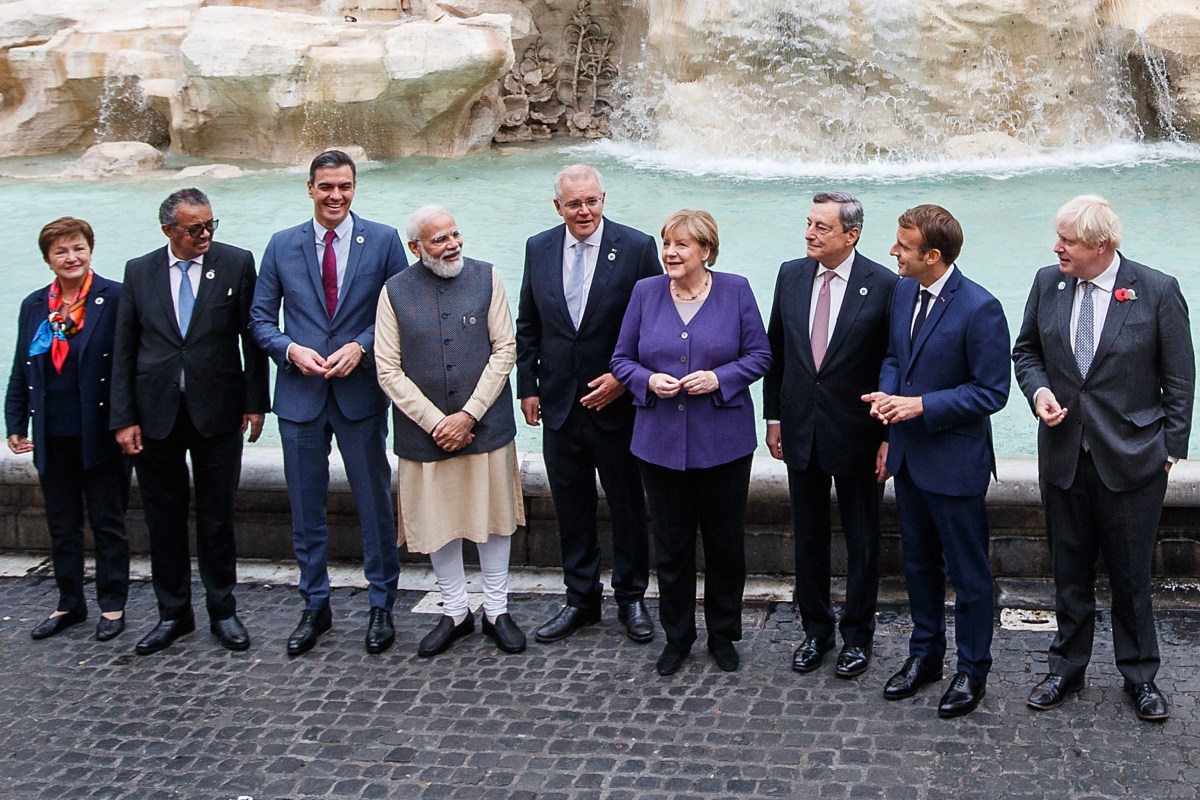What we know today, Monday November 1
Victoria has recorded 1471 new COVID-19 cases and four deaths overnight, with 136 virus patients in intensive care and 86 on ventilators, as the first quarantine-free flights for double-vaccinated international travellers touched down in Australia.

An interstate flight from Sydney lands in Melbourne today. Photo: AAP/James Ross
- Vic records 1471 new cases, four deaths
- REVEALED: One in four chance of an outbreak when borders open
- Call to expand SA vaccine mandate
- France accuses Scott Morrison of lying over subs
- G20 offers few new commitments on climate
- New Adelaide dates announced for Six the Musical
- NSW border reopens to overseas travellers
- SACE exams kick off for 2021
Vic records 1471 new cases, four deaths
Victoria has recorded 1471 new COVID-19 cases and four deaths as the state welcomes its first batch of quarantine-free international travellers since the start of the pandemic.
The figures, confirmed by the health department on Monday, bring the total active infections to 21,959 and the toll from the latest outbreak to 309.
There are 699 people battling the virus in hospital, including 136 in intensive care and 86 on ventilators.
There were 46,065 Victorians tested on Sunday and 14,413 vaccine doses were administered at state-run hubs.
It comes as fully vaccinated international arrivals touching down in the state from Monday will no longer have to undergo 14 days in hotel or home quarantine.
A flight from Singapore is due to land at Melbourne airport on Monday morning, the first of five international planes scheduled across the day.
Passengers don’t have to isolate if they are inoculated with an approved vaccine, provide a negative COVID-19 test within 72 hours of departure and another 24 hours after arrival.
Meanwhile, New South Wales has recorded another 135 cases and four deaths.
REVEALED: One in four chance of an outbreak when borders open
South Australia will have a more than one-in-four chance of a COVID outbreak leading to between four and 51 deaths when the state opens its borders on November 23, according to highly-anticipated modelling handed to the Marshall Government – but immediately removing ongoing restrictions could see the death toll soar beyond 400.
The SA Health-commissioned University of Adelaide modelling, released to InDaily, considers the impact of reopening SA’s borders with 80 per cent of South Australians aged 16 and over fully vaccinated against COVID-19.
Three scenarios are considered: maintaining existing public health and social distancing measures, relaxing the mandated use of face masks in general setting while maintaining other public health measures, and introducing ‘Vaccine Certificates’ to fully-vaccinated people to engage in “higher risk” activities.
In each scenario, only fully vaccinated people would be able to enter SA.
The study, by Professor Joshua Ross from Adelaide’s School of Mathematical Sciences and Dr Thomas Prowse from the School of Biological Sciences, found under the initial scenario that SA would likely be able to manage the ward and ICU demand from COVID-19 infections generated in the community – but not under the latter two scenarios modelled.
Reopening at 80 per cent with all existing public health measures retained would see an estimated 27 per cent chance of an ‘outbreak’ – defined as “averaging more than 100 cases per day over any three-day period”.
“In the event of an outbreak, this scenario is estimated to be manageable with respect to hospital capacity,” the report states, estimating a median Peak Ward Occupancy of 36 beds, with an “extremely small chance of demand exceeding 200 ward beds”.
Peak ICU Occupancy is estimated at a median of nine beds with an extremely small chance of demand exceeding 30, while the median prediction for total deaths under this scenario is 13 over 300 days, with a total range between four and 51.
Premier Steven Marshall announced last week that borders would reopen on November 23, with broader restrictions to be eased once SA hit a vaccination rate of 90 per cent of the population over 12 – which Marshall predicted would occur before Christmas.
However, the modelling includes a table that suggests while the 80 per cent vaccination rate is expected by late November – albeit after the 23rd– the 90 per cent benchmark is not predicted to be met until January, and even then only for people aged 16 and over.
Under the modelling, the chance of an outbreak in the second scenario – removing the mask mandate – soars to 64 per cent, with the researchers predicting this to “present risks to being able to manage cases, in particular with respect to ICU capacity”.
Peak Ward Occupancy would hit a median of 70 beds – and as many as 203, with a 3 per cent chance of demand exceeding 200 ward beds, while the median ICU occupancy peak would be 18 beds, with a 20 per cent chance of exceeding 30.
Under this scenario, the median number of total deaths is modelled at 55.
Under the vaccine certificate model, that median for total deaths rises to 315, with a range between eight and 424.
In that scenario, which is modelled with an expected 75 per cent compliance rate to the vaccination certificate requirement, there is considered to be an 84 per cent chance of an outbreak, which would see ward occupancy surge to 351 beds and ICUs to be clogged with a median peak of 72 (ranging as high as 119.)
-Tom Richardson
Call to expand SA vaccine mandate
The State Government needs to expand mandatory COVID-19 vaccinations to more sectors of the economy, the state’s peak business lobby says, arguing it will be difficult for South Australia to reach the 90 per cent jab target without a broader vaccine mandate.
The call comes as a mandatory vaccination deadline hits all workers in South Australia’s public in private hospitals today. They are now required to have had at least one dose of a COVID-19 vaccine.
A broader mandate is set to come into force for GPs, dental clinics, private nurse offices, pharmacies, private pathology and radiology centres and specialist outpatient facilities next Monday, while SA Police officers will be required to show evidence of receiving a vaccine from November 15.
But Business SA CEO Martin Haese today said the State Government mandate should be expanded to frontline sectors and industries where social distancing is not possible.
“Part of the reason why South Australia has held it together so well during these challenging times is due to maintaining a connection between the employer and employee,” he said.
“Without a broader industry vaccination mandate to give employers clarity and assist with reaching 90 per cent double vaccination by Christmas, we risk losing South Australia’s key advantage of having led the country in managing the virus to date.
“We recognise that not everyone will support a broader sector-specific vaccine mandate, but with over 80 per cent of South Australia already having had their first dose, those in opposition are definitely in the minority.”
Business SA director of policy and advocacy Andrew McKenna said parts of the business community had expressed concerns about jeopardising relationships with employees.
“The South Australian economy is built on the shoulders of small-to-medium-sized businesses, and they are the ones that are interacting daily with their staff,” Mckenna said.
“They don’t want to jeopardise that relationship by mandating vaccines in any additional sectors without a clear direction from the State Government.”
France accuses Scott Morrison of lying over subs
Scott Morrison has rebuffed French President Emmanuel Macron’s accusation Australia “lied” about its decision to scrap a $90 billion submarine contract.
Macron told Australian journalists on the sidelines of the G20 meeting in Rome “I don’t think, I know” the prime minister lied to him about the torn-up deal.
“I have a lot of respect and a lot of friendship for your people,” he said.
“I just say when we have respect, you have to be true and you have to behave in line and consistently with this value.”
WATCH: The extraordinary moment French President Emmanuel Macron accuses Prime Minister Scott Morrison of lying to him. We approached President Macron on the sidelines of the G20. @sbsnews #auspol pic.twitter.com/SUyIcQsiE0
— Pablo Viñales (@pablovinales) October 31, 2021
Morrison rejected Macron’s accusation.
“No,” the prime minister said.
“I will always stand up for Australia’s interests.”
At issue is Australia’s handling of the decision to dump the contract with France in favour of a deal to buy nuclear-powered boats instead under the AUKUS partnership with the UK and US announced in September.
This angered France, which has said it was not told ahead of the announcement and retaliated by recalling its ambassador to Australia.
US President Joe Biden on the weekend described the way the decision by the AUKUS partners was handled as “clumsy”.
“I think what happened was – to use an English phrase – what we did was clumsy. It was not done with a lot of grace,” Biden said during a meeting with Macron in Rome.
“I was under the impression certain things had happened that hadn’t happened.”
Back in Australia, Acting Prime Minister Barnaby Joyce urged everyone to move on from the submarine issue.
“He (Macron) can say that, I understand that people are hurt, but we have got to act like senior politicians as well, and this issue has got to move on,” he told the Seven Network on Monday.
“You just had to read the papers. You have got a pretty good idea that things were not hunky-dory with the contract.”
G20 offers few new commitments on climate

World leaders stand in front of the Trevi Fountain on the second day of the G20 Leaders’ Summit in Rome, Italy, 31 October 2021 (Photo: EPA/Roberto Monaldo/ Lapresse/Pool)
Leaders of the Group of 20 major economies have agreed on a final statement that urges “meaningful and effective” action to limit global warming but offered few concrete commitments and disappointed climate activists, as the UN Climate Change Conference kicks off in Glasgow today.
The result of days of tough negotiation among diplomats at the G20 in Rome leaves huge work to be done at the broader United Nations COP26 summit in Scotland, which started today accompanied by drastic warnings from the scientific community of an escalating climate crisis.
At the invitation of the United Nations, government representatives from almost 200 countries will discuss for a fortnight how humanity can still contain accelerating global warming to a tolerable level.
About 25,000 people are expected to attend, including thousands of journalists and climate protection activists.
COP26 president Alok Sharma, in his opening marks, underlined the importance of the conference to meet the targets set in the 2015 Paris Agreement, including limiting global warming to a maximum of 1.5C above pre-industrialisation-era levels.
“This COP is our last best hope to keep 1.5 in reach. This international conference must deliver,” Sharma said.
But talks between leaders of the G20 bloc have come as a disappointment to those hoping for strong action.
The final summit document from Rome said countries’ current plans on how to curb emissions will have to be strengthened “if necessary” and makes no specific reference to 2050 as a date to achieve net zero carbon dioxide emissions.
The leaders also only recognised “the key relevance” of halting net emissions “by or around mid-century”, removing the 2050 date seen in previous versions of the final statement so as to make the target less specific.
The G20 bloc includes Australia, Brazil, China, India, Germany and the United States and accounts for an estimated 80 per cent of global greenhouse gas emissions.
The final G20 statement includes a pledge to halt financing of overseas coal-fired power generation by the end of this year but set no date for phasing out coal power, promising only to do so “as soon as possible”.
This replaced a goal set in a previous draft of the final statement to achieve this by the end of the 2030s, showing the resistance from coal-using countries, including Australia, China and India.
The G20 also set no date for phasing out fossil fuel subsidies, saying they will aim to do so “over the medium term”.
On methane, which has a more potent but less lasting impact than carbon dioxide on global warming, they watered down their wording from a previous draft that pledged to “strive to reduce our collective methane emissions significantly”.
UN Secretary-General Antonio Guterres, who warned on Friday that the world was rushing headlong towards climate disaster, said the Rome summit was not all he hoped for.
“While I welcome the #G20’s recommitment to global solutions, I leave Rome with my hopes unfulfilled – but at least they are not buried,” he said in a tweet.
“Onwards to #COP26 in Glasgow to keep the goal of 1.5 degrees alive and to implement promises on finance and adaptation for people & planet.”
New Adelaide dates announced for Six the Musical

Six the Musical is coming to Adelaide (Photo: James Morgan/Getty Images)
Six the Musical – the hit show that sees Henry VIII’s six wives transformed from Tudor queens into pop princesses – is coming to Adelaide’s Her Majesty’s Theatre in May 2022.
New dates were announced today for the production, which was originally going to be the first show in the newly rebuilt Her Maj in June last year until COVID-19 brought touring to a halt.
Six has since played a sold-out season at the Sydney Opera House early this year, and will return there in December before touring to Canberra and then Adelaide.
NSW border reopens to overseas travellers
The first flight of fully vaccinated international travellers who will not have to quarantine in Australia has touched down at Sydney airport in a landmark day for NSW’s COVID-19 response.
The first overseas flight touched down at Kingsford Smith Airport before dawn on Monday.
Under the change, fully vaccinated passengers won’t have to quarantine in a hotel or at home, paving the way for Australians stranded overseas to be able to come home for Christmas.
Meanwhile, fully jabbed people in NSW can from Monday start travelling freely between Greater Sydney and the regions.
The lifting of intrastate travel restrictions will allow families to reunite for the first time in months and marks the return of regional tourism.
“For the first time in a long time, grandparents will be able to visit grandkids … many people will be reunited,” Premier Dominic Perrottet said on Sunday.
He’s confident it’s a safe time to allow Sydneysiders back into the rest of the state, with double dose vaccination coverage now nearing 88 per cent.
As of Saturday, 83.6 per cent of eligible NSW residents aged years and over 16 had received their first dose of a coronavirus vaccine and 87.7 per cent were fully vaccinated.
Monday will also see the state’s vaccine booster program open to adults who received their second jab six months ago or longer.
Nationally, rapid antigen tests also become available on Monday.
The changes come as NSW continues to see virus case numbers and hospitalisations fall, after lockdown rules began to be eased three weeks ago.
SACE exams kick off for 2021
More than 12,500 South Australian students are preparing for their SACE exams, as the major stage 2 written examination period begins today.
The exam period, which covers 209 schools across South Australia, will begin with the first Mathematical Methods exams this morning followed by the Essential Mathematics in the afternoon.
It comes ahead of the main exam period which is set to run from November 15 to 29.
Education Minister John Gardner congratulated the class of 2021 for their study efforts this year.
“Exam time can prove to be very stressful for students, but it’s important to keep going and remember that you have a support network of friends, family and teachers to draw upon,” he said.
“While this is an opportunity for students to show off what they have learned, it’s also important to remember these exams are just one part of their schooling journey and won’t define their pathway beyond school.
“I know all South Australians will be wishing our SACE students well today.”
The five most popular subjects for written exams this year are, according to the State Government, General Mathematics, Biology, Mathematical Methods, Psychology and Chemistry.
Final SACE results are set to be distributed on December 13.
-With AAP and Reuters




